
The Free Press

COEUR D’ALENE, IDAHO—A trailer yanks a hog carcass out of a bath of scalding water. Yellowjackets swarm the swine, now hanging by its hooves from the raised shovel of a tractor, as a man dressed in rubber overalls reaches for his knife.
About 400 audience members—many of them parents with young kids, all seated on wooden benches—shift forward as the butcher reveals his secret to producing “effortlessly delicious” pork.
“I just like to get the skin a little wet,” he says, wearing the kind of headset Britney Spears donned in her heyday. “That way your scary sharp knife just slides over the carcass effortlessly.”
He cuts off a clump of hog hair with his blade, which glistens in the morning sun. Most industrial butchers get rid of pork skin, but the butcher says it’s the best part.
Blood pools at the hog’s snout while the homesteaders watch and jot down the butcher’s every word in their notebooks. A woman in front of me, wearing a sun hat with a flap down her neck, draws a diagram of the hog using a pen from Motel 6.
She’s joined today by more than 4,500 Americans, mostly hailing from the Pacific Northwest, for the first-ever Modern Homesteading Conference in Coeur d’Alene, Idaho—a two-day event that teaches attendees how to live off the land. At a time when obesity in the U.S. is at an all-time high, these homesteaders are bucking the convenience of cheap processed foods to grow their own produce in their backyards. Disillusioned by a food system they say is making us fat, sick, and tired, they paid $149—or $399 for a VIP pass—to hear the stars of this movement speak about how to survive off nothing but your own moxie.
Once the presentation ends, a 9-year-old boy shuffles up to the butcher and holds up a Sharpie.
“Will you sign my cast?” the kid mumbles, avoiding eye contact and pointing to his forearm. “I saved you a spot right here.”
The man bends down to sign his name in blue ink: Brandon Sheard.
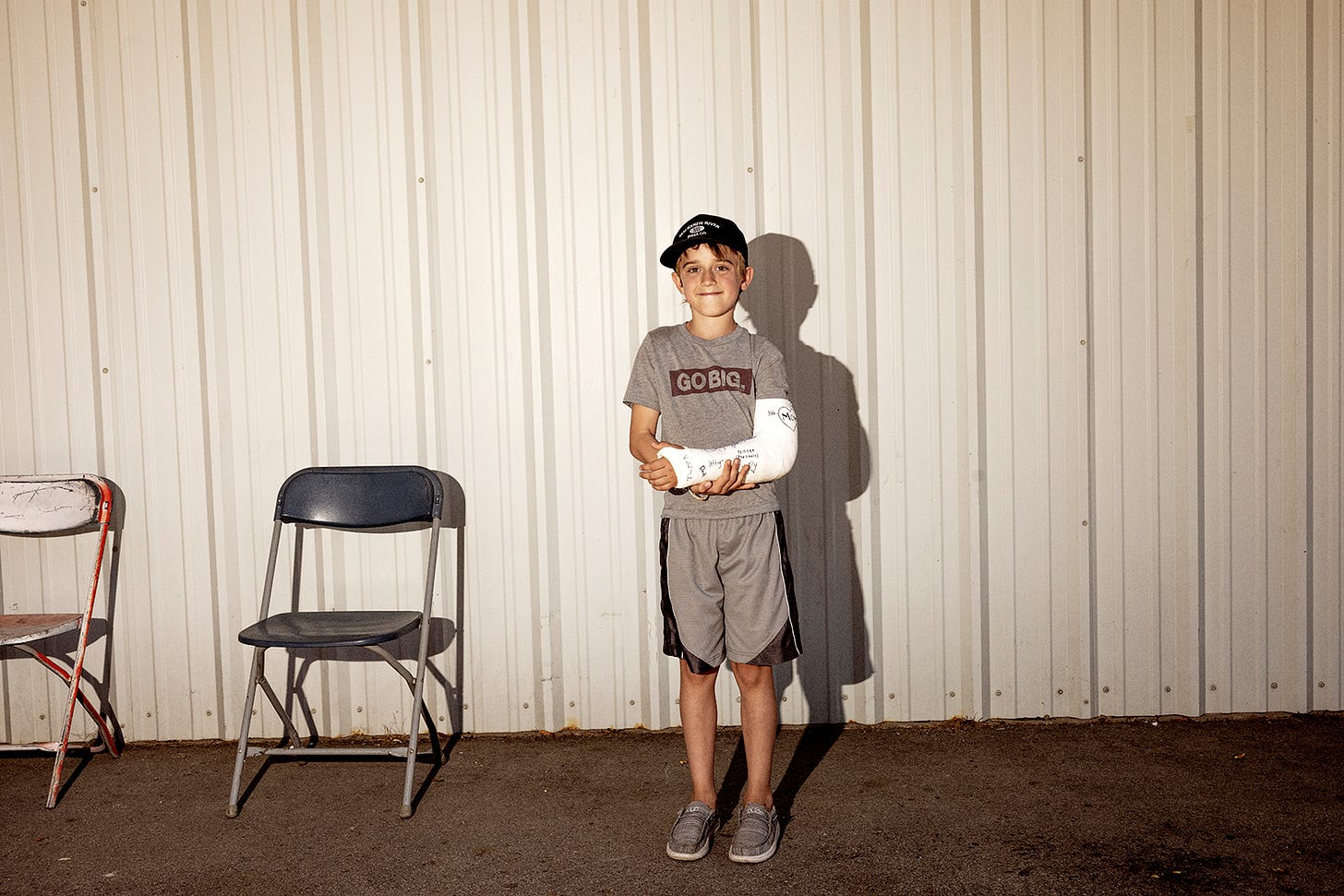
Fifteen years ago, Sheard was nowhere near a farm. He was in Seattle, selling supplements at a Whole Foods during the day and studying Shakespeare for his master’s program in Renaissance literature at night. But sometimes he’d be helping a customer and wonder: Why do we even need vitamins anyway?
“I started to realize, ‘Oh, I could just eat a raw filet and get five, or however many times more iron than an iron supplement,’ ” he tells me.
“The reason we have these supplements is because our food supply is so lacking and so pathetic that yeah, you actually do need to do something extra because you’re not getting it from your food.”
In 2008, Sheard quit his Whole Foods job and married his grad school sweetheart. They started building a house on Vashon Island, near Seattle, where he worked as a butcher at a local farm. Eventually they doubled down on the homesteading life by opening up their own abattoir, which teaches the art of “meatsmithery,” and now they live on a farm in Tulsa, Oklahoma, with their eight children.
Sheard has built a name and business for himself by slaughtering pigs the old-fashioned way—with a rifle and a speedy bullet, aimed just above the eyes. His family sells the meat they produce, culled from breeds that they claim “have evaded the degradation of industrial production.” He also slaughters animals for clients in the Midwest who hire him for his old-world methods, which he swears produce the tastiest meat.
He calls the moment he first tasted homegrown bacon, during his first butchering job on Vashon Island, an “epiphany.”
“It was shocking to me,” he says about the rich, fatty flavor. “I felt like I had been duped my whole life.”

Homesteading is as old as America itself, ever since our founding citizens went westward in search of a place they could call their own.
In 1862, President Abraham Lincoln signed the Homestead Act, granting any lawful citizen 160 acres under one condition: they had to prove they could cultivate the land—a threshold only about half of settlers were able to meet in the policy’s hundred-plus-year history.
The west is long settled—even Bozeman, Montana, has a Whole Foods. But now a new exodus sparked by Covid has seen millions of Americans returning to the land.
Between 2020 and 2021, rural areas grew at faster rates than urban ones for the first time in a decade. Meanwhile, the number of Americans growing their own food has skyrocketed. Though some suburban transplants and new gardeners have since moved back to the cities or hung up their hoes, these conference attendees are in it for the long haul. There are no exact numbers on the size of this movement, or any rules about what it takes to join, but you at least need to cultivate and preserve your own vegetables to be taken seriously by this crowd.

Out of the two dozen homesteaders I spoke with, most were religious—either Catholic or Christian—and many struggled with health problems that they said Western medicine failed to treat. At least half a dozen told me they were in dire straits, struggling with autoimmune disease, stomach ulcers, and allergies, until they started growing their own food. Some attributed their original illness to “vaccine injury,” as one mother put it.
But these are not the isolated, paranoid prepper types that mainstream media mocks. Nearly 60 percent of homesteaders in the U.S. have a bachelor’s degree or higher compared to just under 40 percent of the general public. The average homesteader, according to a survey of almost 4,000, is married, under 50, and religious. And the full political spectrum is represented, with over a fourth identifying as liberal, and nearly 44 percent calling themselves conservative—and 90 percent are active voters.

Many of today’s attendees were converted by the pandemic, Melissa K. Norris, one of the conference’s founders, told me.
“You had folks going to the grocery store and thinking for the first time, ‘I don’t know if I’m going to be able to get what I need for my family,’ ” says Norris, a fifth-generation homesteader in Washington. “And that was the first time many people had experienced that.”
Homesteading, she explains, is the state of going from “just a consumer” to a producer—one who actually knows about where their food comes from, like what kind of soil it grew in and if any chemicals were used.
“So it almost sounds like a control freak,” she says, pausing.
Then she laughs: “But in a good way.”
More Americans are starting to think this way, according to science journalist Nina Teicholz, author of The Big Fat Surprise, who says consumers began questioning official health guidance during the pandemic. The shifting—and often contradicting—federal guidance on Covid measures prompted many to question health guidance they had previously taken for granted, Teicholz says.
“When people started seeing that the peer-reviewed science on masks and vaccines was being censored, it opened up many people’s eyes to the possibility that other types of science were also being silenced and cancelled,” she says. “And the reality is that nutrition science has been silenced, cancelled, ignored, and suppressed.”
Teicholz recently reported on a new food ranking system, partially funded by federal dollars, that rated Fruit Loops as healthier than whole foods like a fried egg, ground beef, and cheddar cheese. Meanwhile, whole milk is banned in public school lunches but low-fat or skim chocolate milk reigns free (the kibosh is due to regulations against saturated fat, even though Teicholz says there’s “zero data” connecting the ingredient to heart disease in kids later in life).
“Their eyes are open to the idea that science can really be manipulated in a way that they had never understood before. And Americans are really naive—I mean, other than the tobacco wars, we really believed that we existed in an upstanding society where science is earnest and doing its best.”
She sighs and adds, “People are waking up to the idea that maybe that’s just not true.”

Back at the hog demonstration, a crowd gathers around Sheard, the butcher, to grab free cuts of the meat he’s giving away.
“Got us two pork chops,” a gray-haired woman shouts, jogging over to her husband and waving two hunks of meat.
Some circle Sheard with questions. A woman yells, “Tell us about your knives.”
Meanwhile, Brent and Morgan Neely are corralling their six kids, scooping them up from the ground where they’ve been playing with pine cones. They drove four hours yesterday from their home in Enterprise, Oregon, to make sure they caught every moment of the presentation.
Philip, the eldest of their six children, is beaming under his blue trucker hat, having just watched Sheard unload the hog’s organs one by one.
“I’m pretty good at eviscerating,” the 12-year-old says, exposing a smile covered in braces.
“That’s gutting,” he explains, meaning removing all the animal’s organs as Sheard just did.
I notice that his younger brothers, 8 and 10, each have pocket knives clipped onto their waistbands—one case has flames and racing stripes carved into it.

Brent, a 36-year-old who owns an online store for pool supplies, was one of the dozen-plus parents I spoke with at the conference who told me they were drawn to homesteading because of the structure it provided their children. In a country where the average child spends eight hours a day glued to screens, these parents told me there’s nothing like the demands of a farm for raising resilient children. For the Neelys that means assigning their kids chores, like cutting down firewood in the winter and helping butcher any deer they hunt. Even “the little guys,” meaning his three- and four-year-old sons, have to sweep a room each morning.
“They have a responsibility to help keep us warm in the winter,” he says. “It’s really good for kids to have that input rather than just playing on screens all day where everything is warm, and ‘Oh, I’m going to whine if it’s cold one day.’ ”
He adds: “You can’t compete with watching a movie for the entertainment factor, but there’s nothing better for them than providing for the family. There’s a real joy to that.”
Dezeray Rathjen is cooling off in the shade, having just presented a session on “Ways to Prepare an Off-Grid Home.”
Her journey here started in 2018, when she says doctors strapped her to a hospital bed and told her she had preeclampsia, a pregnancy complication involving high blood pressure that can be fatal for both mother and child.
“I knew that God wouldn’t make me imperfect,” says Rathjen, a 24-year-old devout Christian raised in a town she’ll identify only as “a very blue place.” “He wouldn’t make me sick, habitually sick. I knew that it had to be something in my day-to-day lifestyle that was making me sick.”
She says the doctors threw up their hands, telling her they didn’t know why she fell ill.
“It’s happening because we’re fed junk,” she said. “We’re poisoned day in and day out.”
During her second pregnancy, she says she read online about the Dr. Brewer method, a high-protein diet developed by the late Tom Brewer, an ob-gyn who first started to connect preeclampsia to “poor nutrition” during medical school in the late 1940s—even though he said none of his professors “ever considered” that diet could be the cause. Immediately, Rathjen began devouring everything she’d been avoiding—eating a steak first thing in the morning, salting her meals, and chugging whole milk.
“I was eating a raw egg every day as a pregnant woman, and I felt the best that I had felt in my entire life. I remember just saying, ‘We’re never going back.’ ”
Now, she lives with her husband and two daughters in northwest Montana, where she milks her own cows, bathes in the nearby creek, and washes her laundry by hand.

Around the corner, a cacophony of 15 women are chattering, feeding their babies, and laughing, some with strawberries in their teeth. They’re relatives, they tell me, well—sort of. Either sisters or sisters-in-law. When I ask what brought them here, most point to Laura Roundy, a 27-year-old mother from Mud Lake, Idaho.
“I guess I just like herbs,” Roundy says.
The pandemic, she says, made her want to collect her own herbs to make medicine. Sometimes she’ll take a Tylenol if her headache gets bad—“I have three little kids; I have to be able to function,” she says.
But when cold medicine “flew off the shelves” during the pandemic, “I realized I wanted to learn how to grow and make my own medicine.”
Sitting on her knees, she puts her hands on her hips and looks around.
“I’m thinking—it’s so easy,” she says. “Why isn’t everybody doing this?”
Across the circle from her, Esther Keate, her sister-in-law who’s pregnant with her seventh child, is receiving a back massage from another sibling. She tells me that her father, who grew up in the Great Depression, taught her to save table scraps and even cut around rotten bits to save fruit. But she’s only now reconnecting to that “waste not, want not” mentality (nearly 40 percent of food goes to waste, one advocacy group claims).
“I try to teach that way of thinking to my kids because you look around our world, and there’s garbage everywhere,” says Keate, a 32-year-old living in Bonners Ferry, Idaho. “I just don’t think that God, who put all of this here for us, would be pleased if he looked down and saw what we did.”
She adds: “That’s why this way of living is coming back. At least on these fairgrounds.”
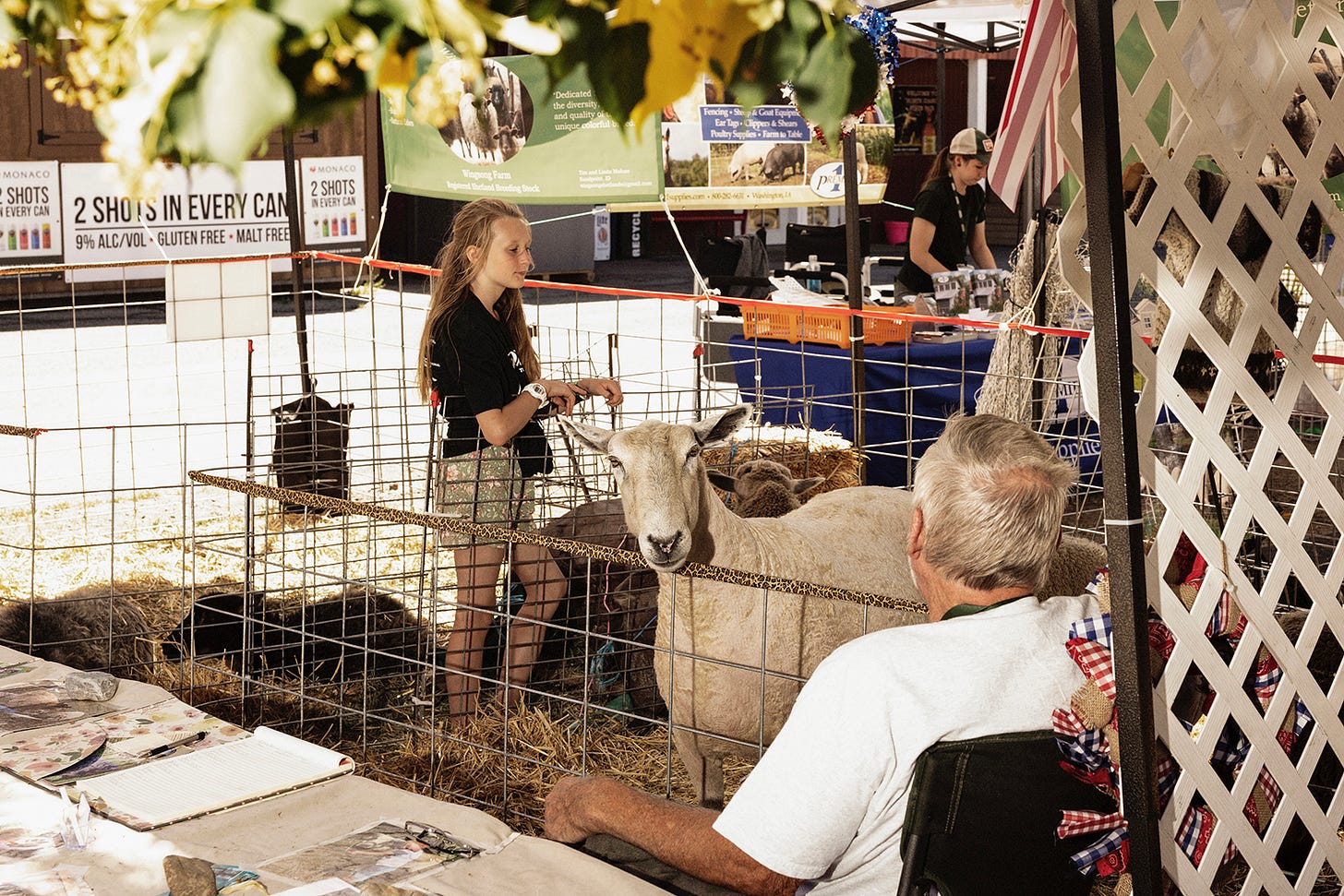
After two days of presentations on “Building a Community Like the Amish,” raising poultry, and the “Soil-Gut-Brain” connection, the conference is over. A medicinal herbs saleswoman packs up her vials in plastic storage boxes. The baby chicks, which kids had been petting earlier, are cajoled into their cages. The projector screen, which had been displaying PowerPoints on grazing patterns, is rolled up.
The homesteaders are called home.
But the VIPs remain—the lucky two hundred or so who either presented at the conference or paid the big bucks to rub elbows with them for the closing dinner.
We’re lined up, cafeteria-style, waiting to be served tonight’s meal—a salad with locally grown garbanzo beans, glass jugs of whole milk, and pork.
Once we get our food, a woman gets on stage to call for prayer. There is the sound of about a hundred men taking off their hats. I notice Sheard, sitting at the table next to me, uncross his legs and bow his head slightly to make the sign of the cross.
“Okay,” the woman shouts into the microphone, “let’s dig in.”
The tent floods with small talk.
A woman at my table, an electrician from rural Washington, reveals her garden was thriving this spring—until an invasive species of slugs discovered it.
“Game over,” she says, picking at her plate. “Those things were eating my freaking lettuce.”
Homesteading is hard work, she tells me. Last spring, she told her boyfriend to pee on the soil every day—something she says an influencer recommended online. Nothing grew in the end except a few tiny vegetables.
“This shit is hard.”
But Rory Feek, a celebrity of the homesteading movement, says that’s the point. Dressed like a nineteenth-century gold miner, wearing suspenders and long sleeves in 80-degree heat, he delivers the closing remarks of the conference, and shares that he’s eleven months into a year with no internet, meaning no GPS, no phone—and no Amazon Prime.
“It’s actually better this way,” says the 58-year-old widower, a long, gray column topped by a pompadour, facing the crowd seated under a canvas tent. “Things mean more to you when you have less.”
He says all across America people are pushing against the grain of the culture, eager to return to the land. He calls this a “great awakening.”
He clears his throat, and lifts up his head to face the audience.
“Once you question the food, you question everything.”
Olivia Reingold is a Free Press writer. Her last piece was about the Crow Nation’s search for a new generation of warriors.
And to support the Free Press mission, become a subscriber today.

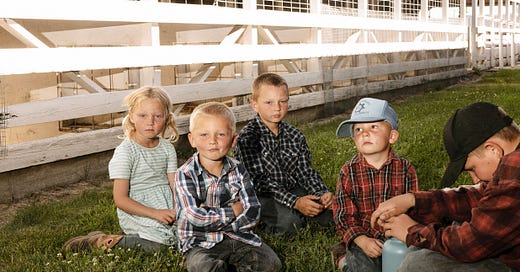






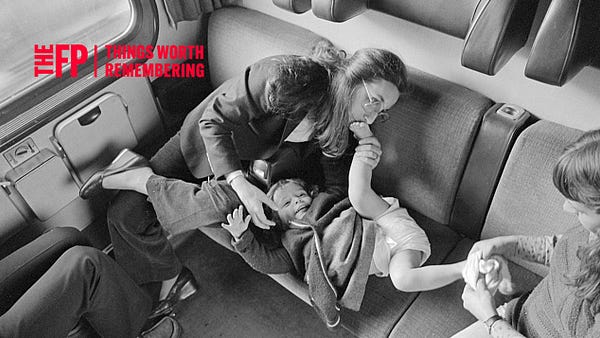



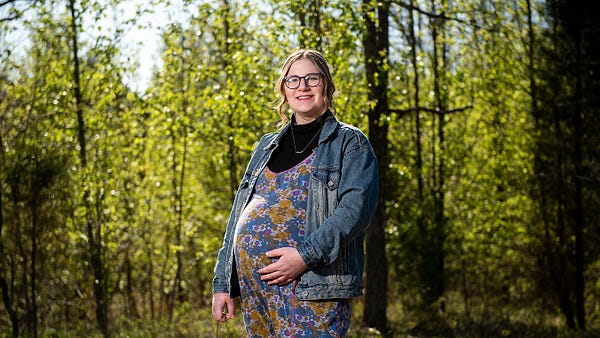


Great article! One minor point is that Catholics are Christians so saying "Christian or Catholic" implies they are not.
FP friends, you don't have to move to Montana to start homesteading, although I do dream of that LOL. For years, I kept bees and chickens in my backyard in an urban city. When covid pushed us out of the city and to the burbs I brought the chickens and bees with me and now I have a modest garden. Now about 50% of what I eat I've grown or raised myself. In the suburbs.
I can't tell you how cathartic it is to watch your food grow. The point being, take whatever control over your food that you can even if you live in the city. You can make a change in your own life.
Much love!